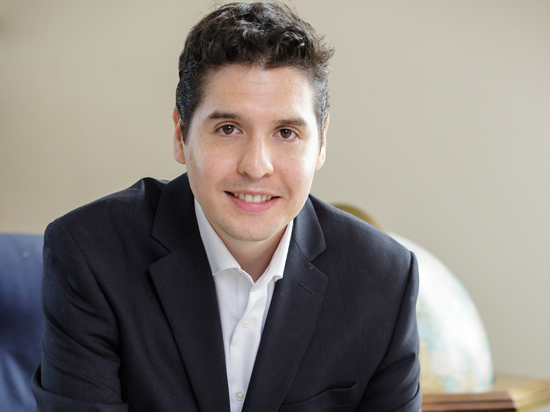
An engaging orchestral conductor, award-winning pianist, and passionate educator, Gonzalo Farias is the Associate Conductor of the Kansas City Symphony. In an ever changing world, Gonzalo’s desire is to establish music-making as a way of rethinking our place in society by cultivating respect, trust, and cooperation among all people in our own community.
Gonzalo Farias served previously as the Associate Conductor of the Jacksonville Symphony and Assistant Conductor of the Virginia Symphony Orchestra. Praised by his “clear, engaging” style “with a lyrical, almost Zen-like quality”, Farias has been established “as a focused, musical artist who knows what he wants and how to get it - with grace and substance.”
Farias was recently selected to conduct at the esteemed Bruno Walter National Conductor Preview, the most important showcase for conductors in America. Designed by the League of American Orchestras, the National Conductor Preview chooses the most promising talents in the world for their podium gift and commitment to the future of American orchestras. Farias was also appointed by the National Endowment for the Arts as a reviewing member for the Grant for Art Projects, judging applications from diverse music institutions to support the latest and most important artistic endeavors in the US.
Farias was also the recipient of the prestigious Baltimore Symphony Orchestra Conducting Fellowship for two seasons. Mentored by Marin Alsop, he assisted leading conductors Robert Spano, Bernard Labadie, Markus Stenz, Christoph König, Johannes Debus, Lahav Shani, among others; he has worked with instrumentalists like Hélène Grimaud, Vadim Gluzman, Johannes Moser, André Watts, and composers Christopher Theofinadis, Anna Clyne, Jonathan Leshnoff, Christopher Rouse, among many others. As former Music Director of the Joliet Symphony Orchestra, Farias transformed the city of Joliet embracing the Hispanic residents of the greater Chicago area with pre-concert lectures, Latin-based repertoire, and a unique side-by-side bilingual narration of Bizet’s Carmen.
During the summers, Farias has worked with Jaap Van Zweden and Johannes Schlaefli in the Gstaad Menuhin Festival in Switzerland as well as with Neeme and Paavo Järvi at the Pärnu Music Festival. In the United States, he was a two-time recipient of the prestigious Bruno Walter Memorial Conducting Scholarship at the Cabrillo Music Festival and named “Emergent Conductor” by Victor Yampolsky at the Peninsula Music Festival. He also attended the Pierre Monteux Festival where he received the Bernard Osher Scholar Prize. Out of 566 applicants and 78 countries, he was chosen one of 24 finalists in the prestigious 2018 Malko Conducting Competition with the Danish National Symphony Orchestra. Hailed by the Gramophone magazine critics, Farias offered one the “most fluent, honest, open hearted and pointed performances”.
Farias was born in Santiago de Chile, where he began his piano studies at age five. He earned his bachelor’s degree at the P.C. University of Chile, and then continued his graduate piano studies at the New England Conservatory as a full-scholarship student of Wha-Kyung Byun and Russell Sherman. He has won first prize at the Claudio Arrau International Piano Competition and prizes at the Maria Canals and Luis Sigall Piano Competitions. As a conductor, Farias attended the University of Illinois working with Donald Schleicher, the Peabody Conservatory with Marin Alsop, and worked privately with Larry Rachleff and the late Otto-Werner Mueller.
Besides having a fond love for piano, chamber, and contemporary music, Farias is a passionate supporter of second-order cybernetics as a way to help understand communication and how complex systems organize, coordinate and interconnect with one another. This includes the interdependent and recursive nature of musical experiences, in which performers and audiences alike interact and respond to each other. His final Doctoral thesis “Logical Predictions and Cybernetics” explores the case of Cornelius Cardew’s “The Great Learning” to redefine music activity as a self-organized organization. In addition to that, he has a warm affection for Zen Buddhism, which has been a major influence in his approach to music and life.